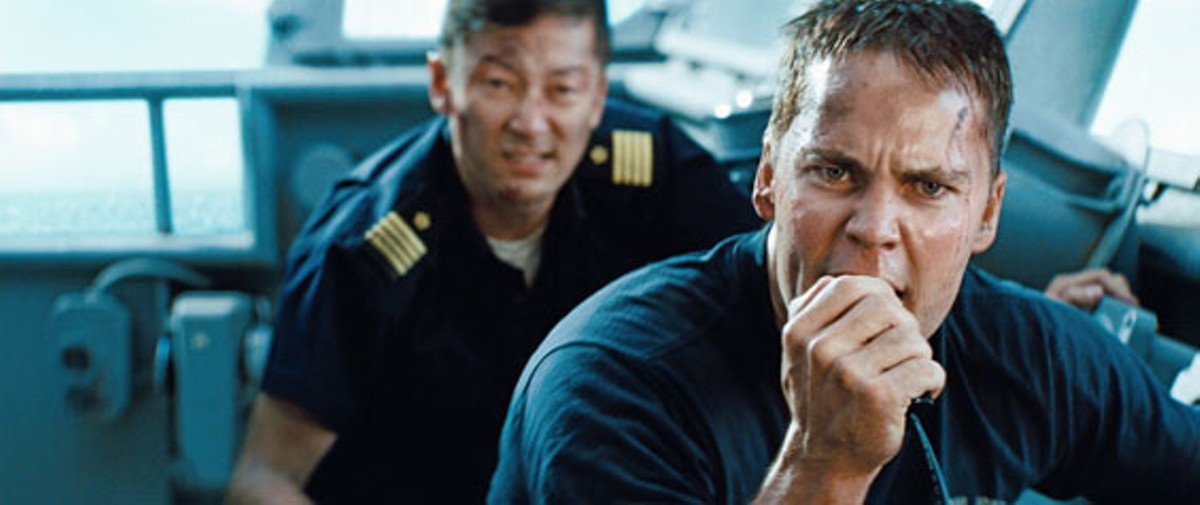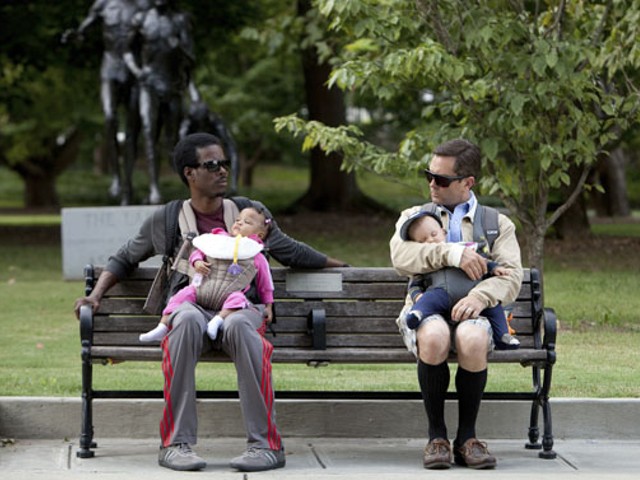Every once in a while, a movie comes along that's so utterly shameless that it achieves a certain grandeur. Peter Berg's Battleship, which I swear to God is described in its Wikipedia entry as an "American science fiction action naval war film," is one such movie.
Over the past few years, the military-industrial-entertainment complex has been going great guns, with salutes to the Army (fellow Hasbro production G.I. Joe), Navy SEALs (Act of Valor) and now this $200 million hail to the fleet, which takes up the unusual task of extrapolating a story arc from that game with the little red plastic pegs, principally remembered as being easy to cheat at. (The screenplay, by Jon and Erich Hoeber, goes through such extraordinary narrative contortions in order to justify an allusion to the game's familiar grid-work board and guessing-game strategy, it's probably deserving of some sort of award.)
Establishing its tendency to shuttle between intimate soap opera and planetary-scale cataclysm, Battleship begins with the news that scientists have discovered and are attempting to make contact with a solar body in a distant galaxy — "Planet G," whose atmospheric conditions are possibly favorable to life — using a transmitter in Hawaii. This is where we join shaggy Alex Hopper (Taylor Kitsch), sousing away his 26th birthday at an Oahu bar, picking up Samantha (Brooklyn Decker) with an act of nutty bravado while his straitlaced Navy-lifer big brother, Stone (Alexander Skarsgård), looks on disapprovingly.
When we next catch up with the Hoppers, Alex — now Lieutenant Hopper, having been forcibly recruited for his own good by his brother — is still a disciplinary case and can't win the approval of Samantha's father, Pacific Fleet admiral Shane (Liam Neeson). On the eve of the multinational RIMPAC naval exercises, Alex is on the brink of being busted out of the service while at the same time, vast cool and unsympathetic intellects on Planet G are regarding this earth with envious eyes. The space invaders splash down a few crafts, quite reminiscent in their intricately shifting movable-parts design and metallic cacophony to leftover Hasbro Transformers. The extraterrestrials themselves are Homo sapien–like, except they have claw-machine-grabber hands, quill-like goatees, and cool military hardware like Google glasses and forcefield technology, which they use to seal off the Hawaiian islands. This effectively strands the assembled fleets of the Pacific Rim out at sea, leaving only destroyer USS John Paul Jones inside, the last craft capable of preventing the aliens from using the transmitting equipment to dial up reinforcements, meaning an end to life on this planet as we know it. It should go without saying that the JPJ is the ship crewed by out-of-his-depth Lieutenant Alex and — why not? — Rihanna.
Peter Berg, creator of Friday Night Lights and director of the estimable The Rundown, is in street-fighting mode here — that is, he does not hesitate to pull any dirty trick in order to get the job done. I was able to withstand the emotional suction when hothead Alex, suddenly cut off from his relied-upon sibling, learned to control his temper, tamp down his ego and appreciate the value of teamwork. I restrained with effort the palpitations of One World sentiment when Hopper and his former foe on the soccer pitch, Japanese Maritime Self-Defense Force Captain Nagata (Tadanobu Asano), banded together to resist another sneak attack in the common protection of all mankind, exorcising the ghost of Pearl Harbor. I was even able to maintain my composure, just barely, when the double-amputee ex-Army hero played by Iraq vet Gregory D. Gadson — shades of Harold Russell in The Best Years of Our Lives — got his wish to play soldier again. But by the time the crew of old salts who had weathered Okinawa, Iwo Jima and Korea emerged deus ex machine–style to serve their country once more, I was a lost cause. And when the F-14s came out for a triumphant flyover, I looked around the room to find the moron who was applauding only to realize that it was me.






